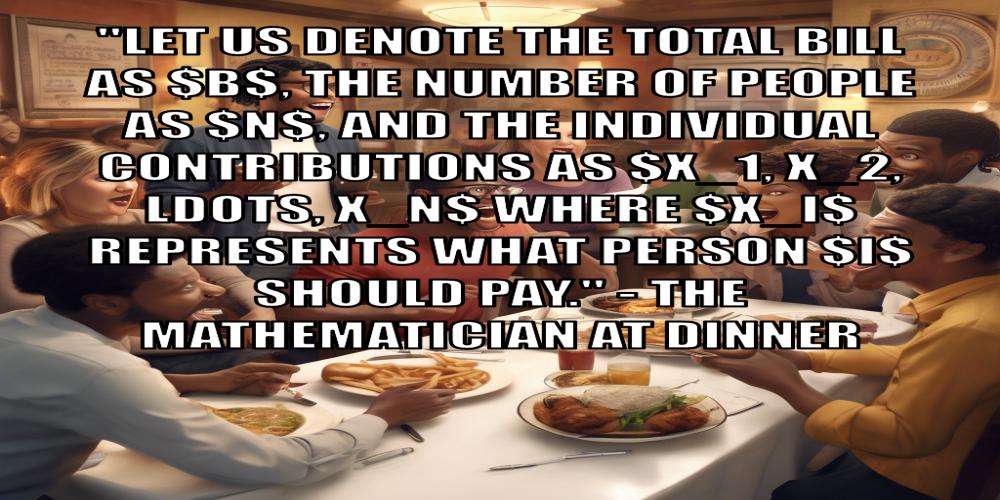Trying to Split the Bill Like a Mathematician
When the Bill Arrives and You're a Math Whiz
Picture this: you're out for dinner with a group of friends. The food was great, the conversation was lively, and now the bill has arrived. As everyone reaches for their wallets, one friend, who happens to be a mathematician, takes a deep breath and says, "Let's split the bill evenly." But wait, that's not what they mean. What follows is a journey into the world of "splitting the bill like a mathematician."
The Initial Proposal
You might think that "splitting the bill evenly" means dividing the total by the number of people. But for a mathematician, that's just too simple. Instead, our math whiz friend pulls out a notepad and a pen. "Let us denote the total bill as $B$, the number of people as $n$, and the individual contributions as $x_1, x_2, \ldots, x_n$ where $x_i$ represents what person $i$ should pay," they begin.
Everyone else at the table exchanges glances. "So, what you're saying is, we need to solve for $x_1, x_2, \ldots, x_n$ such that $\sum_{i=1}^{n} x_i = B$," another friend who took a math class in college chimes in, trying to keep up.
Itemized Contributions
The mathematician nods enthusiastically. "Yes, but we need to make sure that everyone pays for what they ordered. So, let $y_i$ represent the total cost of what person $i$ ordered. Thus, what we need is for $x_1 + x_2 + \ldots + x_n = y_1 + y_2 + \ldots + y_n$, where $y_1 + y_2 + \ldots + y_n = B$."
Another friend, who ordered a salad and a water while others had steaks and wine, looks a bit relieved. "So, if I only had a $10 salad and a $2 water, I should only pay $12, right?"
"Well, that makes sense," the mathematician says, "but we need to account for shared items like appetizers and the tip. Let $A$ be the total cost of shared items and $T$ be the tip. Thus, the total bill $B$ can be expressed as $B = \sum_{i=1}^{n} y_i + A + T$."
Calculating the Tip
Another friend, who is a bit more practical, suggests, "Why don't we just round up the total bill to make the math easier?" The mathematician shakes their head. "Round up? No, no, no. The tip should be a percentage $t$ of the pre-tip total $B'$, where $B' = B - T$. Thus, $T = t \times B'$, so $B = B' + T = B' + t \times B' = B'(1 + t)$."
At this point, the waiter comes by to check on the group. "Everything okay here? Need anything else?" The group collectively shakes their heads, and the waiter leaves, probably wondering what all the scribbling and intense discussion is about.
Solving for Individual Payments
To make it fair, the mathematician suggests that everyone should pay for what they ordered plus an equal share of the shared items and the tip. "So, if $A$ is the total cost of shared items, each person should pay $\frac{A}{n}$ for the shared items. Similarly, the tip should be split evenly, so everyone should pay $\frac{T}{n}$ for the tip. Thus, person $i$ should pay $x_i = y_i + \frac{A}{n} + \frac{T}{n}$."
Another friend, who is a bit of a joker, says, "So, what you're saying is that if I ordered a $50 steak and you ordered a $10 salad, I should pay $50 + \frac{A}{n} + \frac{T}{n}$ and you should pay $10 + \frac{A}{n} + \frac{T}{n}$?"
"Exactly!" the mathematician exclaims, clearly pleased that someone is following along.
Finalizing the Bill
However, another friend who is a bit more financially savvy points out, "But what if some people didn't drink alcohol? Shouldn't the tip be split based on the pre-tip total excluding the alcohol?"
The mathematician nods again. "Good point. Let $B_a$ be the part of the bill that includes alcohol. Those who didn't drink should only contribute to the tip based on $B' - B_a$. Thus, if $m$ people drank alcohol, the tip should be split such that drinkers pay a part of the tip based on $B' - B_a + \frac{B_a}{m}$ while non-drinkers only pay based on $B' - B_a$."
By now, everyone else is just staring blankly. The friend who ordered the salad and water finally says, "You know what? Let's just round up the total bill, divide it by the number of people, and call it a day. I'll pay a bit more, and you'll pay a bit less. It all evens out in the end."
The mathematician sighs, "But that's not mathematically precise!"
Another friend pats them on the back. "Sometimes, friendship is more important than mathematical precision."
Conclusion
So, the next time you go out to eat with a mathematician, be prepared for a detailed and logical breakdown of the bill. But remember, sometimes it's okay to round up and make life a little simpler. After all, the goal is to enjoy the company and the meal, not to solve a complex mathematical equation.










